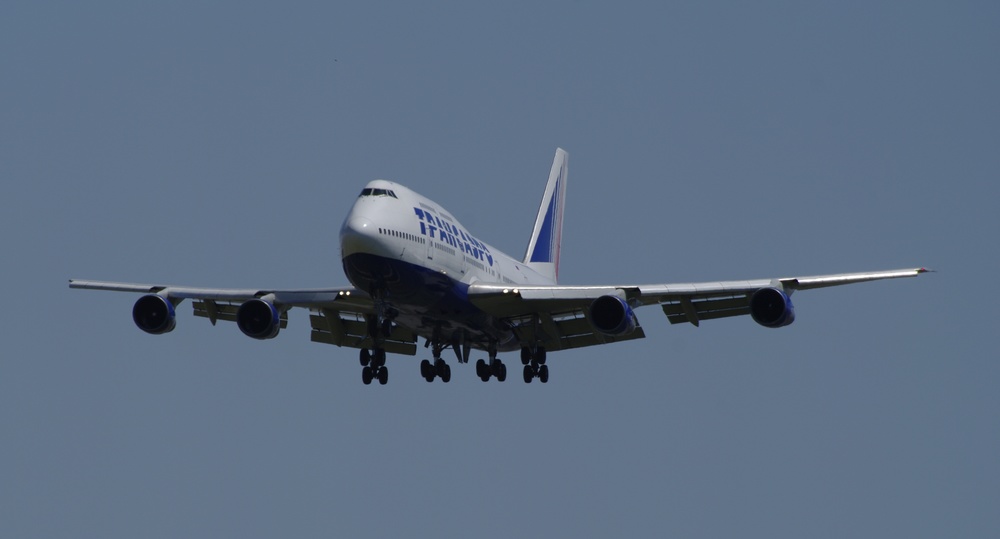Insights from Transaero Airlines
There is still plenty of interesting material from the MAKS air show that will eventually make its way to these pages, but, in the meantime, and given that we are now reporting from Russia, we would like to switch the attention to what is going on in the airline industry of the largest country on Earth...
And this is basically growth (+16.3% on the first seven months of the year compared with same period last year), but also some interesting strategic moves that might have an effect on the industry's competitive landscape in years to come.
Some hot issues at the moment are: the likely emergence of a domestic low cost airline industry in Russia (most likely led by incumbent traditional carriers, such as Aeroflot), Moscow's long-term airport development plans and strategic agreements between major Russian airlines.
And where best to go look for some insights on all these matters than at one of the key players in the Russian airline industry, Transaero Airlines (Трансаэро ).
What follows is the interview we conducted with Dmitry Stolyarov, First Deputy General Director of Transaero Airlines:
Q: What is Transaero's position regarding expansion at different Moscow airports? Is Vnukovo going to become the main Moscow base for Transaero after UTair's agreement? What is going to be the role of each Moscow airport (Domodedovo, Vnukovo and Sheremetyevo) in Transaero's future plans?
A: Transaero Airlines is gradually continuing to develop at each of the three airports of the Moscow Aviation Hub. This development strategy meets both the market requirements and passengers’ needs as clients have a choice of the most convenient airport for them. The airline regards all three airports as its hub - providing transfer opportunities with its own flights and with flights of partner-airlines.
Q: What are the main motivations for moving traffic to Vnukovo? Congestion at Domodedovo or the recent partnership agreement with Vnukovo-based UTair?
A: Transaero launched its flights from Vnukovo airport in April 2012 (the Memorandum on strategic partnership with the airport was signed in February 2012). One of the reasons why the airline started to perform flights from Vnukovo, inter alia, was the fact that Domodevodo airport has congestion problems. At the same time, a new spacious high-tech Terminal A provides the most convenient conditions for departures and arrivals as well as providing passengers with comfortable facilities when waiting for connecting flights and transfers.
Starting from the beginning of 2013 Transaero has concentrated its efforts on establishing the large transit centre at Terminal A of Vnukovo Airport. Given this priority, Transaero has adjusted its flight schedule to provide convenient flight connections to destinations in Russia, the CIS and other countries.
The Agreement with UTAir Aviaton is the latest step in the airline’s development of the air services from Vnukovo airport.
Q: Does UTair agreement apply only to Vnukovo operations or to all other Russian airports where any of the two airlines (Transaero or UTair) operates? Are we going to see UTAir acting more as a domestic feeder to Transaero's international operations?
For example, would a passenger flying from London to Tyumen be able to book and travel using a single ticket (and get some frequent flier miles) while transfering at Moscow from Transaero to UTair as if he was traveling on the same airline?
The Agreement on Strategic Partnership with UTAir Aviation applies to operations from Vnukovo airport as well as from other Russian airports. UTAir Aviaion is not considered as a feeder to Transaero’s operations. The route networks of the two airlines successfully complement each other, both domestically and internationally.
According to the agreement, a passenger will be able to get a single ticket for his/her entire route for travel, with a connection at a certain airport. The airlines will aim to unify their frequent flyer loyalty programs, allowing passengers to earn points for his/her entire journey.
Q: What is Transaero's position on the rumored opening of a UTAir low cost base at Yermolino airport, about one hour outside Moscow? Has Transaero any plans to enter the low cost market directly?
We cannot comment on the actions or intentions of our partners.
As for Transaero, the airline has no plans to launch low-cost operations. After careful consideration we have made the conclusion that at the current stage the Russian laws regarding airlines are insufficient to provide for low cost operations.
There is no legal basis that could ensure the efficient implementation of a low-cost service model. In particular:
The law states that airlines must provide key services (meals, luggage allowance)
In Russia, airlines have no right to sell non-refundable tickets. Transaero Airlines is proactively lobbying for the introduction of changes in the law with a view to lifting these restrictions.
The existing airport infrastructure does not allow for the level of handling services necessary for low-cost carriers;
A contributing factor is the substandard travel infrastructure in Russian regions – specifically a lack of cheap and affordable hotels and hostels.
Q: A few days ago a plan was presented that called for more airport capacity to be built in the Moscow region. Does Transaero have any position on the need for new airport capacity in Moscow or adapting some smaller airports such as Yermolino in the Kaluga region?
The capacity of the three key Moscow airports – Vnukovo, Domodedovo, and Sheremetyevo - is far below the limits.
The existing capacity of the airports is sufficient to meet the airlines’ needs for many years to come under the condition of proper management of the existing infrastructure (including roads, railways, airport ground infrastructure (runways and taxiways), as well as the introduction of changes in air traffic management).
As a comparison, look at London Heathrow airport - its annual passenger traffic exceeds the overall passenger traffic of the three airports in the Moscow aviation hub.


